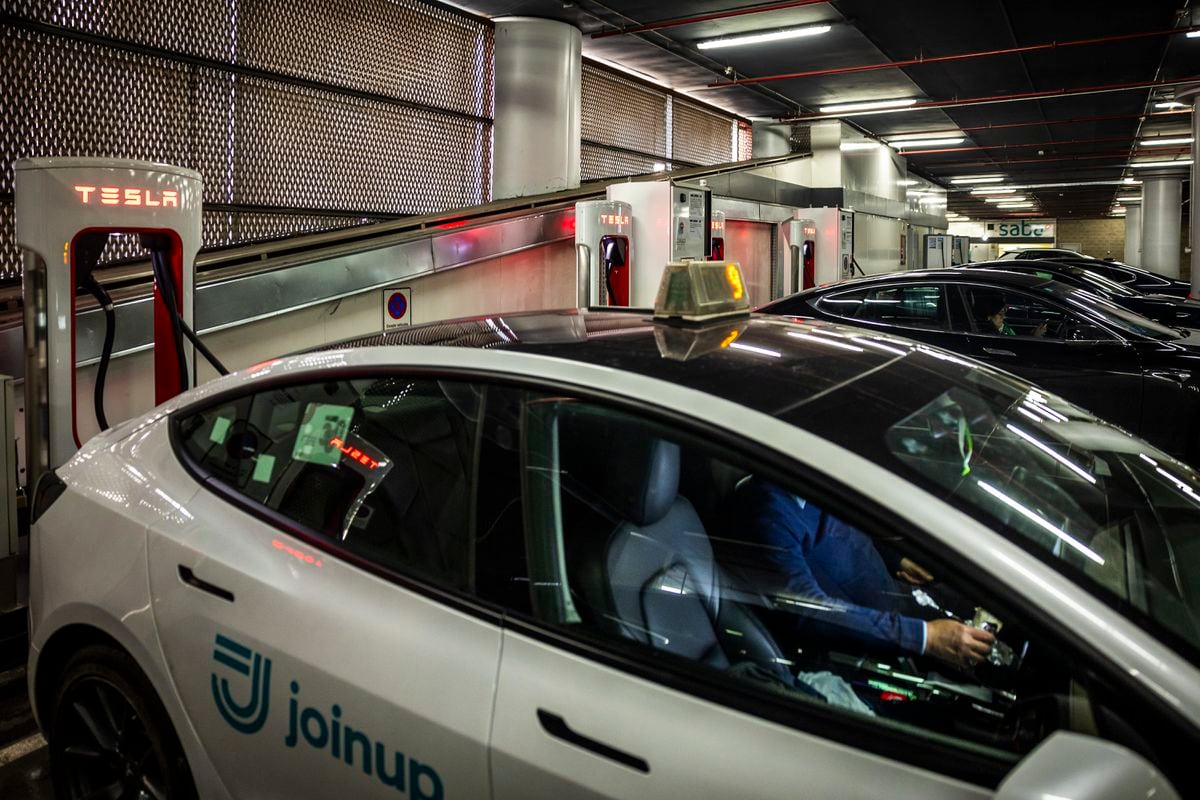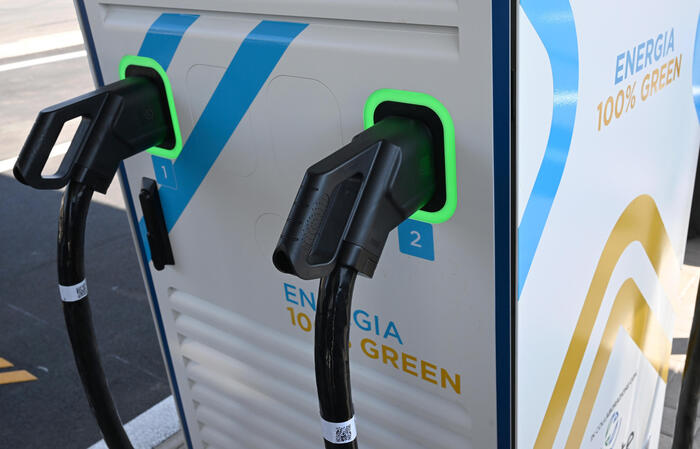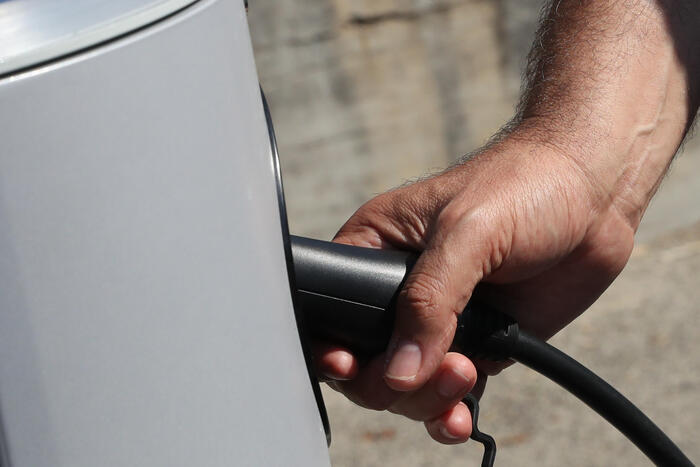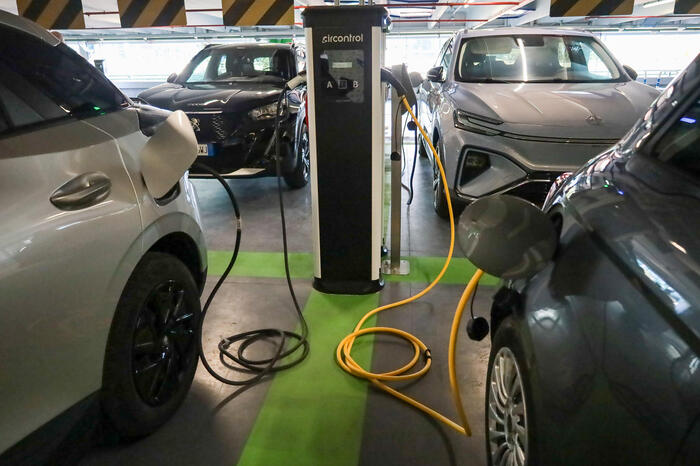The French electric car market occupied 9.8% in 2021, 13.3% in 2022
(
PFA, press kit, 2022
)
.
To adapt and support the progress of electric vehicles in France, the government is forcing certain players to adapt and install charging stations, or prepare the equipment.
To discover
March: what vegetables and fruits are in season?
What are the places for which the law imposes a charging device for electric vehicles?
Several places can or must be equipped with a charging device or pre-equipment for electric vehicles.
Charging station and companies
New office buildings
-
or which are undergoing major renovation - and which include a car park, must have
(
article L113-12 of the Construction and Housing Code
, I)
:
- At least
1 pitch out of 5 pre-equipped
and 2% of these pitches, with at least 1 pitch, are sized to be accessible to people with reduced mobility.
- At least
1 location
, the size of which allows access to people with reduced mobility,
equipped
for charging electric vehicles and plug-in hybrids.
In car parks with more than 200 hundred parking spaces, at least 2 spaces are equipped, one of which is reserved for people with reduced mobility.
For
existing buildings
, before 1 January 2025, companies that have more than 20 parking spaces, covered or not, must
install charging stations
: at least 1 charging point for electric and plug-in hybrid vehicles, located on a location whose size allows access to people with reduced mobility
(
article L113-13 of the Construction and Housing Code
)
.
Charging stations and new constructions of residential buildings
New residential buildings with more than 10 parking spaces, indoors or outdoors, must all have 1 pre-equipment for the installation of charging stations for electric vehicles
(article L113-12 mentioned above, II)
.
Charging stations and old residential buildings
For existing buildings, the issue of implementing charging solutions must be included on the agenda of the annual general meetings of co-owners
(
article 24-5 of law no. 65-557 of July 10, 1965 establishing the status co-ownership of built buildings
).
Individual home charging stations
If you live in a single-family home, you can equip yourself to charge your electric car, with no other obstacle than budgetary constraints and those linked to the configuration of your electrical network.
Good to know
The pre-equipment makes it possible to subsequently accommodate a charging point for an electric or rechargeable hybrid vehicle
(
article L113-11 of the Construction and Housing Code
)
.
It is not an obligation to install a charging point.
Read alsoWhat are the rules for renting a garage?
Is the installation of a charging station mandatory in condominiums?
No, the installation of a charging station as such is not mandatory in condominium buildings that have already been built.
In co-ownership, it is possible to equip yourself with an electric charging station:
- Installation of individual equipment: you have your parking space equipped, at your own expense, thanks to your right to pick up.
You just have to send your request to the syndic of co-ownership by registered letter with acknowledgment of receipt containing the detailed description of the work to be carried out.
The installation request will be put on the agenda of the next general meeting of co-ownership, but is not subject to a vote.
- Installation of collective equipment: you have all or part of the parking spaces in your building equipped, subject to having the majority agreement of the co-owners.
Good to know
The syndicate of co-owners represented by the syndic cannot oppose, without serious and legitimate reason, the equipment of parking spaces with facilities dedicated to electric charging for electric vehicles
(
article L113-16
of the aforementioned code).
What financial aid is there to help install charging stations?
Several financial aids exist to relieve charging station installers.
The tax credit
You can benefit from a tax credit if you have an electric vehicle charging station installed in your main or secondary residence
(
article 200 quater C of the General Tax Code
)
.
The advantage granted is equal to 75% of the amount of expenses, limited to 300 euros per charging system.
Aid for the installation of an electrical terminal in a building
If you are a tenant or owner of an apartment within a condominium, you can install an individual or collective charging station within the building.
To support you, state aid is available:
- The
Future
bonus .
Its amount depends on the solution adopted in an apartment building:
1. Installation of a charging station in a private parking space: the State bears 50% of the final bill (cost of supply and installation) up to a ceiling of 960 euros per charging point, excluding tax.
We are talking about a right to take.
2. Installation of a charging station in a shared parking space for all occupants of the residence: the State pays 50% of the final bill within a ceiling of 1660 euros per charging point .
3. A syndicate of co-ownership installs a collective infrastructure serving all the spaces in its car park: the State bears 50% of the final invoice within a ceiling excluding tax of 8,000 euros per co-ownership, and up to 3,000 euros for outdoor road works.
- VAT reduction
: the VAT rate is reduced to 5.5% instead of 20%.
This reduction is directly applicable to the installation estimate for the installation, installation and maintenance of charging stations.
- Aid from your municipality, your department or your region
: find out directly on the various websites to find out about the aid to which you are entitled.
For example, the city of Paris pays for the pre-equipment of electricity up to 50% of the amount excluding VAT of the works within the limit of 4000 euros.
Good to know
There are several applications for locating charging stations for electric vehicles.
For example, IZIVIA, Plug Surfing, Freshmile or Chargemap.
What is the existing legislative arsenal regarding the installation of charging stations?
To be able to support the progress of 100% electric cars, the State is legislating to promote the deployment of the charging infrastructure network for electric vehicles.
Its stated objective is to reach 7 million charging points for electric cars by 2030.
Here is a non-exhaustive inventory of the measures taken:
- Law No. 2010-788 of July 12, 2010 on the national commitment to the environment (Grenelle II).
It provides that all collective housing and new office buildings, whose building permit is filed after July 1, 2012, must be pre-equipped with charging stations in individual parking spaces.
- Decree No. 2014-1302 of October 30, 2014. It offers the possibility for the owner or tenant, in a rental or co-owned building, to:
Benefit from a personal charging station thanks to the right to plug.
Ask the owner or the condominium association to install a charging station in the building or in the parking lot.
- Law No. 2015-992 of August 17, 2015 on energy transition for green growth.
It extends the obligation of pre-equipment with a charging station to certain existing buildings, for tertiary, industrial and commercial use.
The number of places pre-equipped to accommodate company charging stations depends on the parking capacity, the type of building and the date of filing of the building permit.
She distinguishes:
Existing buildings for which the permit application was filed before January 1, 2012.
Existing buildings for which the permit application was submitted between January 1, 2012 and January 1, 2017.
- Decree No. 2016-968 of July 13, 2016 relating to facilities dedicated to charging electric or plug-in hybrid vehicles and infrastructure allowing the parking of bicycles during the construction of new buildings.
It extends the pre-equipment obligation to all new non-residential buildings for which the building permit application is submitted after 1 January 2017.
- Law n° 2019-1428 of December 24, 2019 on the orientation of mobility (LOM):
It defines the pre-equipment of a parking space as the installation of conduits for the passage of electric cables and the power supply and safety devices necessary for the subsequent installation of charging points for electric and hybrid vehicles. rechargeable.
It refers to a decree issued by the Conseil d'Etat to set the minimum characteristics of the power supply and safety devices for charging installations for rechargeable electric and hybrid vehicles.
It obliges the trustees to include the questions of equipment in IRVE (Electric Vehicle Charging Infrastructure) on the agenda of the general meeting of co-owners.
It provides for the obligation for companies to install charging stations in car parks with more than 20 spaces.
At least 1 place per 20 places.
It imposes pre-equipment or equipment for all new buildings built after March 11, 2021.
- Decree No. 2020-1696 of 23 December 2020 relating to the minimum characteristics of power supply and safety devices for charging installations for rechargeable electric and hybrid vehicles.
- Decree 2020-1720 of December 24, 2020. It facilitates the exercise of the right to take by reducing procedural delays, clarifying the procedure and extending the system.
Good to know
On September 30, 2022, France had 71,630 charging points open to the public
(
Avere, data published on October 7, 2022
)
.








